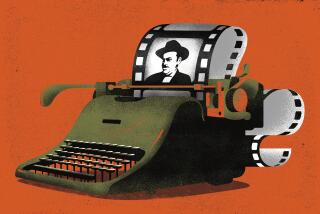Text messages
BookExpo America 2005 got rolling a week ago Friday with neither a bang nor a whimper, but a shriek. As the participants filed into Manhattan’s Jacob K. Javits Convention Center, a bagpiper paraded around the lobby, swelling hearts and shredding eardrums. Was this a subliminal wake-up call to the industry itself, which has been struggling with stagnating sales and a multimedia-driven culture? Perhaps. But the throng of booksellers, editors, authors, publicists and journalists gathering for the annual publishing powwow seemed determined as ever to meet, greet and overeat. And despite some recent challenges -- including the National Endowment for the Arts’ controversial warning last year that literary fiction is about to follow the great auk into extinction -- the mood on the convention floor was notably upbeat.
You could sense it in the animated bustle of the crowd. When Mark Twain kicked off the very first meeting of the American Booksellers Assn. in 1902, he addressed an audience of 60. This time around, more than 25,000 people registered for the convention, and they all appeared to be clogging the aisles, grabbing up promotional items -- key chains, shortbread cookies, voodoo dolls, refrigerator magnets -- and spreading good cheer.
There were, of course, some things to be cheerful about. Oprah Winfrey announced a new selection for her book club: a triple-decker serving of William Faulkner: “As I Lay Dying,” “The Sound and the Fury” and “Light in August.” At the Vintage booth, staffers looked as if they had just won the lottery, which indeed they had -- 500,000 copies of the $29.95 boxed set were already shipped, with an additional 100,000 on the way.
The Oprah effect is arguably a force of nature, yet it has little bearing on the general health of the industry. Publishers were wheeling out their heavy hitters for the summer and fall, including much-buzzed titles from Gabriel Garcia Marquez, Jonathan Harr, Joan Didion, J.R. Moehringer, Paul Auster, Terry McMillan, Dava Sobel and Adam Gopnik. And editors at every level of the food chain sounded at least cautiously optimistic.
“The mood is good,” said Viking’s Paul Slovak. “The market is stable. Yes, the independents are still struggling to pay their bills. And the blockbuster mentality continues to creep in: Everybody seems to be reading and reviewing the same books. But given that sales are essentially flat, people are feeling pretty good.” And Dennis Loy Johnson of Melville House suggested that vest-pocket operators like himself may actually be entering a golden age as mainstream publishers increasingly shy away from riskier projects: “They’re selling product; we’re selling ideas. It’s a very exciting time to be an independent publisher.”
It is also a time of undeniable transition, and the symptoms were everywhere. For the first time, manga producers like Viz Media (“We put the pop in culture”) made a major splash on the floor, pushing comic books one step closer to stuffed-shirt respectability. Meanwhile a steady stream of visitors poured into the Google booth, with its battery of shiny iMacs and soft-spoken personnel. “We’re here to sign up publishers for the Google Print program,” one staffer told me, alluding to the company’s plan to assemble an immense, universally accessible library of digital texts. How fast will virtual books replace their ink-and-paper counterparts? Nobody knows. We may just have to wait until next year’s BookExpo for a progress report. *
More to Read
Sign up for our Book Club newsletter
Get the latest news, events and more from the Los Angeles Times Book Club, and help us get L.A. reading and talking.
You may occasionally receive promotional content from the Los Angeles Times.






